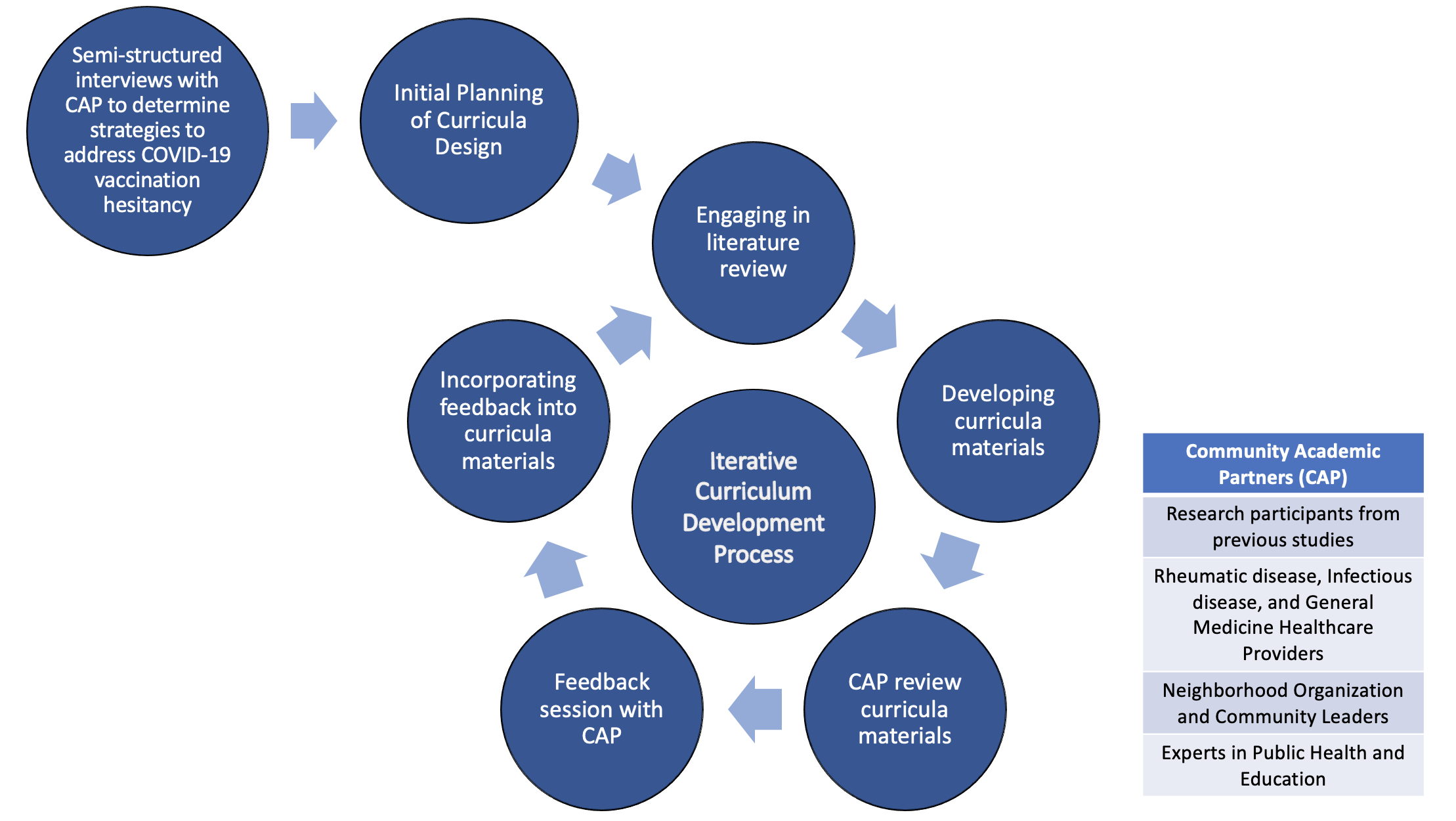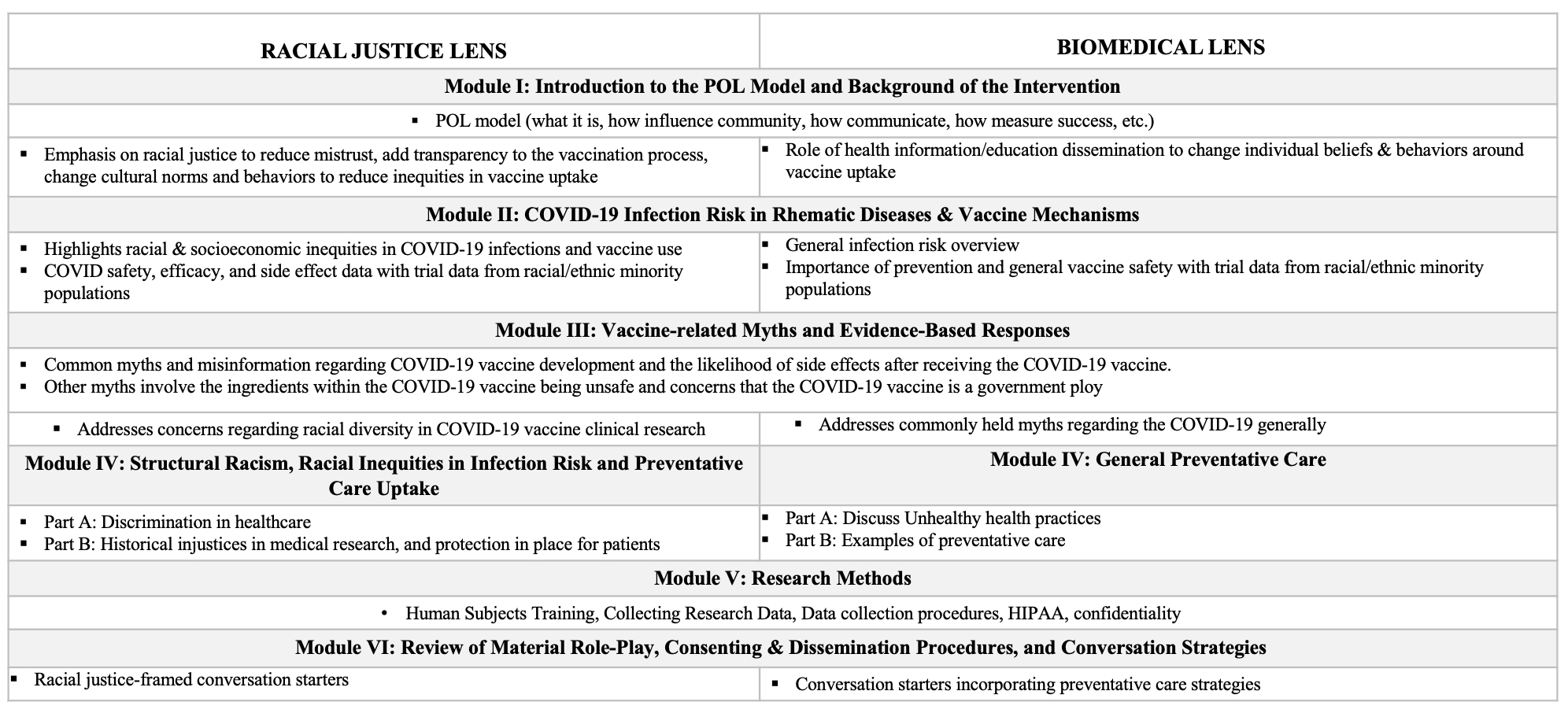Session Information
Session Type: Poster Session C
Session Time: 10:30AM-12:30PM
Background/Purpose: Despite the efficacy of COVID-19 vaccines and the benefits for individuals with rheumatic conditions, racial inequities in uptake persist. We initiated a trial that trains trusted community leaders (Popular Opinion Leaders, POLs) with vaccine-related educational materials to disseminate information through their social networks (e.g., friends, family, and community members) to reduce vaccine hesitancy and improve uptake. The trial focuses on Black and/or African American individuals with rheumatic conditions given known COVID-19-related inequities. POLs are randomly assigned to receive COVID-19 vaccine training through a racial justice lens or a traditional biomedical preventive care lens to determine which strategy results in better information dissemination and vaccine uptake. We aimed to use a community-engaged iterative approach to develop these curricula.
Methods: We leveraged long-standing community-academic partnerships in two U.S. cities to develop the two curricula with twenty-two racially and ethnically diverse individuals of varying backgrounds and expertise (Figure 1). Following presentation of the initial drafts, our community and academic partners reviewed these materials and provided written, individualized feedback. Over one year, we held monthly Zoom meetings with our partners across both cities to discuss feedback, which influenced further curricula drafts and pre- and post-tests for each module.
Results: Throughout this iterative process, the primary challenges encountered and addressed were concerns regarding the curricula’s constantly evolving content given updated vaccine recommendations, as well as literacy level, tone, and accessibility to a general audience (Figures 1 and 2). Two interactive virtual curricula each consisting of six modules (Table 1) were developed with pre- and post-tests for each. One curriculum used a racial justice approach, acknowledging the effects of multiple levels of racism on vaccination uptake, and highlighting the importance of the vaccine to reduce inequities by race and ethnicity. The second curriculum utilized a traditional biomedical lens; public health experts grounded COVID-19 vaccinations in preventative care strategies, highlighting the importance of healthy behaviors. The core medical content of both curricula was identical.
Conclusion: Strategies to reduce racial inequities in COVID-19 vaccine uptake must acknowledge the root causes of vaccination hesitancy and address nuanced concerns that drive vaccine avoidance amongst Black individuals. Longstanding community academic partnerships are essential to develop culturally relevant trial materials.
To cite this abstract in AMA style:
Osaghae E, Sirek G, Roberson T, Chandler M, Childs A, Crespo-Bosque M, Curry G, Dhand A, Dollear M, Eggleston A, Ezeh N, Fleurissaint D, Garrett D, Granville G, Jean-Jacques M, Losina E, Milaeger H, Muhammad L, Nelson M, Nosamiefan C, Ojikutu B, Pillai N, Jacques Toussaint M, Son M, Valle A, Williams J, York M, Mancera-Cuevas K, Feldman C, Ramsey-Goldman r. Community-Engaged Curriculum Development Using Racial Justice and Biomedical Lenses to Address COVID-19 Vaccine Hesitancy in Black Individuals with Rheumatologic Conditions [abstract]. Arthritis Rheumatol. 2024; 76 (suppl 9). https://acrabstracts.org/abstract/community-engaged-curriculum-development-using-racial-justice-and-biomedical-lenses-to-address-covid-19-vaccine-hesitancy-in-black-individuals-with-rheumatologic-conditions/. Accessed .« Back to ACR Convergence 2024
ACR Meeting Abstracts - https://acrabstracts.org/abstract/community-engaged-curriculum-development-using-racial-justice-and-biomedical-lenses-to-address-covid-19-vaccine-hesitancy-in-black-individuals-with-rheumatologic-conditions/



